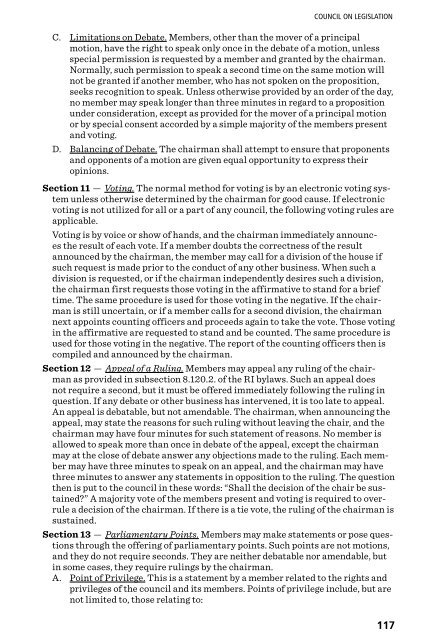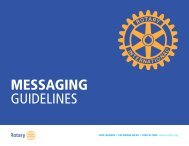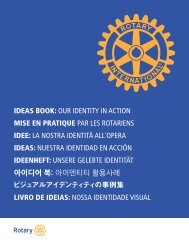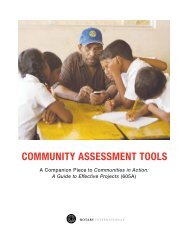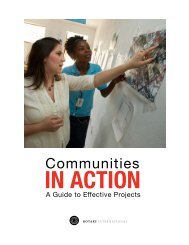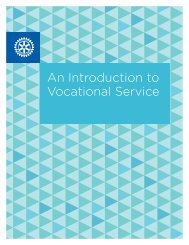Manual of Procedure
Rotary International Procedure
Rotary International Procedure
You also want an ePaper? Increase the reach of your titles
YUMPU automatically turns print PDFs into web optimized ePapers that Google loves.
COUNCIL ON LEGISLATION<br />
C. Limitations on Debate. Members, other than the mover <strong>of</strong> a principal<br />
motion, have the right to speak only once in the debate <strong>of</strong> a motion, unless<br />
special permission is requested by a member and granted by the chairman.<br />
Normally, such permission to speak a second time on the same motion will<br />
not be granted if another member, who has not spoken on the proposition,<br />
seeks recognition to speak. Unless otherwise provided by an order <strong>of</strong> the day,<br />
no member may speak longer than three minutes in regard to a proposition<br />
under consideration, except as provided for the mover <strong>of</strong> a principal motion<br />
or by special consent accorded by a simple majority <strong>of</strong> the members present<br />
and voting.<br />
D. Balancing <strong>of</strong> Debate. The chairman shall attempt to ensure that proponents<br />
and opponents <strong>of</strong> a motion are given equal opportunity to express their<br />
opinions.<br />
Section 11 — Voting. The normal method for voting is by an electronic voting system<br />
unless otherwise determined by the chairman for good cause. If electronic<br />
voting is not utilized for all or a part <strong>of</strong> any council, the following voting rules are<br />
applicable.<br />
Voting is by voice or show <strong>of</strong> hands, and the chairman immediately announces<br />
the result <strong>of</strong> each vote. If a member doubts the correctness <strong>of</strong> the result<br />
announced by the chairman, the member may call for a division <strong>of</strong> the house if<br />
such request is made prior to the conduct <strong>of</strong> any other business. When such a<br />
division is requested, or if the chairman independently desires such a division,<br />
the chairman first requests those voting in the affirmative to stand for a brief<br />
time. The same procedure is used for those voting in the negative. If the chairman<br />
is still uncertain, or if a member calls for a second division, the chairman<br />
next appoints counting <strong>of</strong>ficers and proceeds again to take the vote. Those voting<br />
in the affirmative are requested to stand and be counted. The same procedure is<br />
used for those voting in the negative. The report <strong>of</strong> the counting <strong>of</strong>ficers then is<br />
compiled and announced by the chairman.<br />
Section 12 — Appeal <strong>of</strong> a Ruling. Members may appeal any ruling <strong>of</strong> the chairman<br />
as provided in subsection 8.120.2. <strong>of</strong> the RI bylaws. Such an appeal does<br />
not require a second, but it must be <strong>of</strong>fered immediately following the ruling in<br />
question. If any debate or other business has intervened, it is too late to appeal.<br />
An appeal is debatable, but not amendable. The chairman, when announcing the<br />
appeal, may state the reasons for such ruling without leaving the chair, and the<br />
chairman may have four minutes for such statement <strong>of</strong> reasons. No member is<br />
allowed to speak more than once in debate <strong>of</strong> the appeal, except the chairman<br />
may at the close <strong>of</strong> debate answer any objections made to the ruling. Each member<br />
may have three minutes to speak on an appeal, and the chairman may have<br />
three minutes to answer any statements in opposition to the ruling. The question<br />
then is put to the council in these words: “Shall the decision <strong>of</strong> the chair be sustained?”<br />
A majority vote <strong>of</strong> the members present and voting is required to overrule<br />
a decision <strong>of</strong> the chairman. If there is a tie vote, the ruling <strong>of</strong> the chairman is<br />
sustained.<br />
Section 13 — Parliamentary Points. Members may make statements or pose questions<br />
through the <strong>of</strong>fering <strong>of</strong> parliamentary points. Such points are not motions,<br />
and they do not require seconds. They are neither debatable nor amendable, but<br />
in some cases, they require rulings by the chairman.<br />
A. Point <strong>of</strong> Privilege. This is a statement by a member related to the rights and<br />
privileges <strong>of</strong> the council and its members. Points <strong>of</strong> privilege include, but are<br />
not limited to, those relating to:<br />
117


